By Robert St. Martin
Santa Monica, California (The Hollywood Times) 01/18/2024
The American Cinematheque is presenting a large retrospective of the films of German director Wim Wenders in January of 2024. The series was launched with Wenders’ current Oscar contender Perfect Days (2023) at the Aero Theatre in Santa Monica on January 10, where it was coupled with an earlier Wenders film Tokyo-Ga (1985). Wenders was present for the Q&A, as he was for the screening of Wings of Desire (1987) on Friday, January 11 at the Aero Theatre. Wings of Desire won Wenders the Best Director Award at Cannes that year.
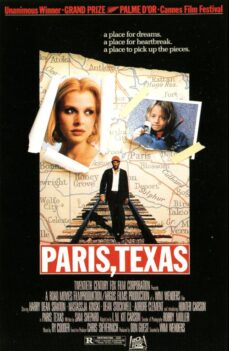
On last Saturday, the American Cinematheque showed at the Egyptian Theatre in Hollywood Wenders’ Until the End of the World (1991) and one of his best-known films Paris, Texas – the 1984 drama road film directed by Wim Wenders, co-written by Sam Shepard and L. M. Kit Carson, starring Harry Dean Stanton and Dean Stockwell with Nastassja Kinski. Paris, Texas won the Palme d’Or at Cannes in 1984. Wim Wenders has been in Los Angeles for these recent screenings and provided insightful commentary at Q&A with these events, as well as the screening of his recent Anselm (2023) at the Laemmle Glendale Theatre. The Hollywood Times has previously reviewed both Perfect Days and Anselm.
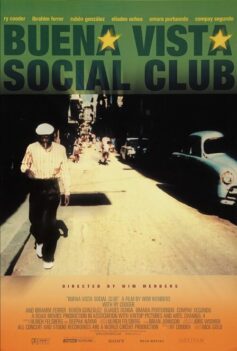
Coming up are more Wenders film in this retrospective by the American Cinematheque. On Saturday, January 20 at the Los Feliz Theatre will be a screening of the much beloved Buena Vista Social Club (1999) which Wenders shot in Cuba and featured many of the original singers and musicians from the famed Cuban band. He followed the old heroes of the traditional Cuban son music on their path from being completely forgotten to becoming world famous – within the period of just a few months.
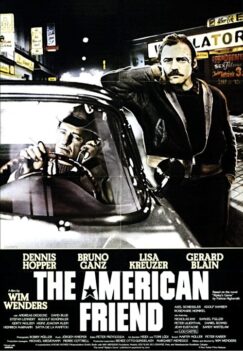
That is followed on Saturday by his well-known The American Friend (1977), a loose adaptation of Patricia Highsmith’s novel Ripley’s Game. Dennis Hopper oozes quirky menace as an amoral American art dealer who entangles a terminally ill German everyman, played by Bruno Ganz, in a seedy criminal underworld as revenge for a personal slight – but when the two become embroiled in an ever-deepening murder plot, they form an unlikely bond. Filmed on location in Hamburg and Paris, with some scenes shot in grimy, late-seventies New York City, Wenders’s international breakout is a stripped-down crime story that mixes West German and American film flavors, and it features cameos by filmmakers Jean Eustache, Samuel Fuller, and Nicholas Ray.
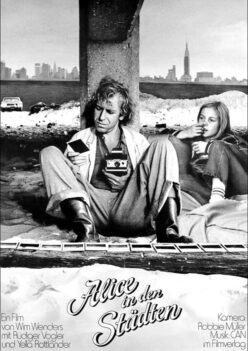
On Sunday, January 21, at the Egyptian Theatre in Hollywood, the American Cinematheque is showing three of Wenders’ ground-breaking road movies from the 1970. These are the films that first introduced Wenders to the American public. Alice in the Cities (1974) is Wim Wenders’s fourth film, but he often refers to it as his first, because it was during this film that he discovered the genre of the road movie. It was also his first film to be shot partly in the U.S. and the first to feature his alter ego, Philip Winter (Rüdiger Vogler). The German journalist Winter wants to write a story about America but is unable to accomplish anything but a series of Polaroids before disappointedly beginning his journey back home. In New York, he reluctantly agrees to take little Alice (Yella Rottländer) with him, because her mother (Lisa Kreuzer)—whom he meets on the day before his departure—has urgent business to take care of there. In Amsterdam, the mother then fails to appear as they agreed, so Winter and Alice set out to try to find Alice’s grandmother in the Ruhr region. During their search, their initial mutual dislike gradually transforms into a heartfelt affection.
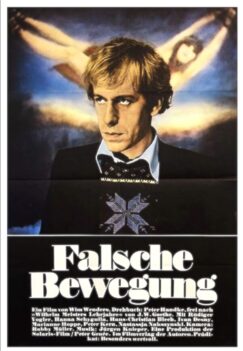
Alice in the Cities will be followed by Wrong Move (1975) based on the novel by Peter Handke. It is about a young novelist (Rudiger Vogler), in 1970s West Germany who decides to go on the road so that he can reconnect with the world he wants to write about. At first this seems like an easy project – he would travel across the country, observe his countrymen and absorb the stories they are willing to share with him. He is convinced that the movement – the journey and the exchange of information – would quickly recharge his intellectual batteries and after that it would be only a matter of time before he writes a brilliant book. The second story is about a country struggling to choose an identity. It is not that difficult to tell that the novelist is in fact Wenders’ alter ego and that his frustration belongs to the director and is only channeled through him. So, in a way Wrong Move is also a cinematic confession, only here it brings to the spotlight an entire country whose sense of guilt has transformed most of its people into disillusioned loners and pessimists.
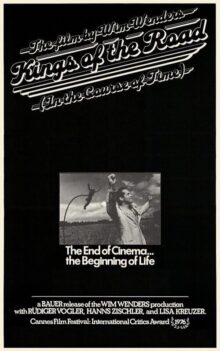
The third road movie is Kings of the Road (1976) is about a friendship between two men: Bruno (Rüdiger Vogler) who repairs film projectors and travels along the inner German border in his truck, and the psychologist Robert (Hanns Zischler) who is fleeing from his own past. When Robert drives his old Volkswagen straight into the Elbe River, he is fished out by Bruno. This is the beginning of their shared journey through a German no-man’s-land, a journey that leads them from the Lüneburg Heath to the Bavarian Forest. Wenders began the film without a script. Instead, there was a route that he had scouted out beforehand: through all the little towns along the Wall that still contained a movie theater in this era of cinematic mass extinction. The old moving van with the film projectors in the back becomes a metaphor for the history of film – it is no coincidence that the film is dedicated to Fritz Lang. This “men’s story” also treats the themes of the absence of women, of loneliness, and of postwar Germany.
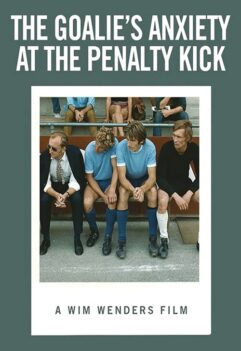
The Wenders Retrospective will wrap up with the early film The Goalie’s Anxiety at the Penalty Kick (1972) on Wednesday, January 23, at the Los Feliz Theatre. The Goalie’s Anxiety at the Penalty Kick is a 1970 short novel by the Austrian Nobel Prize winning writer Peter Handke. The goalkeeper Josef Bloch (Arthur Brauss) was sent off after committing a foul during an away game. This causes him to completely lose his bearings. He wanders aimlessly through) an unfamiliar town, spends the night with the box-office attendant of a movie theater (Erika Pluhar), and strangles her the next morning. But instead of turning himself in or fleeing, Bloch then goes to the country place of his ex-girlfriend (Kai Fischer) and passively waits there for the police to come and arrest him. As Wim Wenders himself has stated, the visual idiom of Alfred Hitchcock’s films provided the model for his debut film. He adheres minutely to the thoroughly “cinematic” source, the novel by Peter Handke. With his cameraman Robby Müller and his editor Peter Przygodda – both of whom had already worked with him on his film thesis at the HFF (University of Television and Film Munich)— he set forth a collaboration that would weld this team together for years.
Finally on Wednesday, January 31, the Los Feliz Theatre will screen Wenders’ Lightning Over Water (1980). This film was made in just a few weeks at a time about the last months in the life of American director Nicholas Ray, who is probably best known for his cult film Rebel Without a Cause.